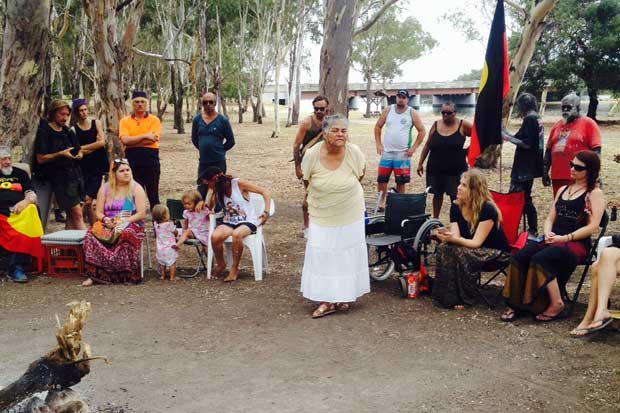The WA government’s plans to close up to 150 remote Aboriginal communities, and wind back state Aboriginal heritage legislation, a form of “systematic racism” that prioritises development over Aboriginal interests, has been savaged at a key United Nations forum on Indigenous issues.
The Kimberley Land Council yesterday addressed the United Nations Permanent Forum on Indigenous Issues in New York, drawing support from international human rights organisations and NGOs against what it labels a “discriminatory and race-based erosion of Indigenous rights” in Australia.
Late last year, WA Premier Colin Barnett announced his plans to close down up to 150 remote Aboriginal communities after signing an ‘historic agreement’ with the Commonwealth to offload remote municipal and essential services to the states.
The plans have been condemned across Australia, leading to several protests in the wake of Prime Minister Tony Abbott’s controversial comments that taxpayers shouldn’t be expected to fund the ‘lifestyle choices’ of Aboriginal people living on country.
Yesterday, KLC Chairman Anthony Watson and CEO Nolan Hunter addressed the international forum and met with the UN Special Rapporteur on the Rights of Indigenous Peoples Victoria Tauli Corpus, and Australia’s representative Professor Megan Davis, who chairs the forum.
Its submission calls for support for Aboriginal communities standing up against the controversial proposal, citing Australia’s signing of the UN Declaration on the Rights of Indigenous Peoples, the only international instrument that enshrines the rights of the world’s 370 million Indigenous peoples.
In the absence of any form of domestic instrument to protect Aboriginal rights, the UN Declaration is one of the few tools available. Australia endorsed the declaration in 2009, but it is not legally binding and governments regularly contravene many of its articles.
The KLC submission to the UN said the forced community closures would be carried out with “complete discrimination”, “without a long term vision or alternative” and “with complete disregard to the economic, social and cultural wellbeing of the Indigenous people residing in them”.
“History shows us that these policies have resulted in the gradual disintegration of cultural standards and governance; it has resulted in fringe communities in urban areas, in alcoholism and youth suicides, and in disempowerment. And now the Australian Government is allowing it to happen again,” the submission said.
The KLC cited Article 8 of the UN Declaration, stating that “we have a right not to be subjected to forced assimilation or destruction of our culture”. Articles 10, 26, 27 and 32 further “affirm our rights in relation to our land and article 19 provides that we must first consent to these actions,” according to the submission.

The WA government’s less publicised plans to amend state heritage laws also came under fire.
The KLC said the Aboriginal Heritage Act already controls Aboriginal cultural heritage for the “community at large, but is not in the best interests of Indigenous people”.
“(It is) primarily directed at processes to allow lawful damage to or destruction of our heritage places and objects.”
Changes to the Act hand greater power to the Minister.
“This law is in the process of being amended to further narrow opportunities for Indigenous people to participate in the management, control or protection of their cultural heritage, and to provide even greater legal control over our heritage to government,” the KLC said.
“The Aboriginal Heritage Act, in both its current state and proposed amended form, is contrary to international human rights norms and is an example of systemic racism legitimatised and institutionalised by legislative means.
“These laws entrench principles of colonial superiority and provide legal protection for systemic racism.
“These laws therefore amount to a forced taking of our heritage so that it can be destroyed, damaged or compromised by the state in accordance with its own laws for the benefit of mining companies and other developers. “
The amendments will be debated in WA Parliament later this year.
Mr Watson said the UN was an international platform to raise awareness while the cries of Aboriginal people were falling on deaf ears domestically.
“Community closures and changes to the WA Aboriginal Heritage Act strip Indigenous people of our rights to protect culture and dispossess us from our lands. These are human rights issues,’’ Mr Watson said in a statement.
“Our calls in Australia for engagement, discussion and empowerment have fallen on deaf ears. We are being ignored by all levels of government. The United Nations provides an international platform for us to raise awareness about these racist and discriminatory actions.’’
He said Aboriginal people needed to be involved in decision-making.
“Our message is clear: Aboriginal people want to be involved in all levels of decision-making and in the implementation of those decisions.
"We understand our issues better than anyone else and we know the best way to address those issues. We want to be accountable; we want to be in charge of our own futures. We ask that governments stop dictating to us and start engaging with us."
Donate To New Matilda
New Matilda is a small, independent media outlet. We survive through reader contributions, and never losing a lawsuit. If you got something from this article, giving something back helps us to continue speaking truth to power. Every little bit counts.



